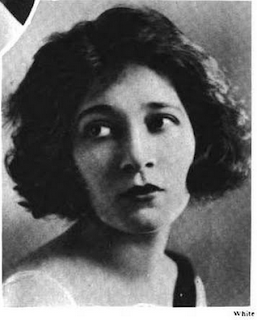“The moving finger writes and having writ, caresses a
camel…”
This was one of Universal’s most expensive productions
and starred the irrepressible Priscilla Dean as Sari, part-time street thief, occasional
dancer and full-time force of nature. Kevin Brownlow introduced and held us spellbound
recounting his meeting with Ms Dean who, even in her old age was larger than
life being a volunteer driver of her local fire truck and as down-to-earth as
any former Hollywood idol had any right to be.
Kevin saw this film half a century ago and doubted that
it had been projected since and this is the pure essence of Kennington Bioscope;
yes, we’re quite spoiled in London with screenings at the BFI, Barbican and
elsewhere but at the Cinema Museum we get to see the rare and unusual. It
matters not whether every one is a classic; there’s always something to appreciate
and this audience is packed full of connoisseurs.
Now, there may have been a little cork in this vintage adventure but with Mr Gabrysch conjuring up a
musical meltemi and Pruce – as co-star Wally Beery called her – whipping up a
storm, this one flew by without presenting too many surprises: we even get the inevitable Omar Khayyam quote.
 |
| Zoonoses are diseases that can be transmitted from animals to humans. |
In the streets of Stanboul, the striking Sari steals
bread to feed puppies, kisses pigeons as she shares her food and even snogs the odd
camel… that’s how committed ‘Cilla was and some evidence of director Tod Browning's gift for strange charm. Naturally she attracts the attention of
Capt. Carlisle Pemberton (Wheeler Oakman aka Mr Dean) who is in town to cement an alliance
with the Black Horse cavalry of Capt. Kassari (Nigel De Brulier, later John the
Baptist, out of the desert in Nazimova’s Salome).
There’s also less welcome attention in the form of Sheik Ahmed
Hamid (Bad-boy Beery) who collects wives like some men collect 16mm film and
has trust and anger-management issues that spell trouble. Finding out that his
favourite wife, Resha (Ethel Ritchie), has been carrying on with a westerner, Hector
Baron (Edmund Burns), he kills the man in the mosque. Now, as luck would have
it, Sari has snuck into the mosque, even though women, “not having souls” (a false understanding of Islam still persistent in Western views at the
time), are not allowed to be there.
 |
| Wheeler Oakman was married to Cilla Dean from 1920 to 1926 |
Sari went there to try and teach herself to pray after
overhearing Capt. Carlisle discussing her, and, clearly impressed, wondering
out loud if he should teach her… You have the feeling that the Captain’s God
may be required to help at some point, especially after Sari attracts the attention
of the sour Sheik.
As Carlisle heads off to the desert – which seems
remarkably close to Stanboul – Ahmed makes moves to marry Sari by making her
mother an offer she can’t refuse… Can Christian fortitude triumph over
misguided local custom and will Leery Beery emerge triumphant with his hareem
enhanced?
It’s fast paced with a thoroughly predictable yet thrilling ending and Priscilla
Dean is impressive throughout although perhaps not the most convincing
casting given the film’s title. The film was based on a story by one Herbert
Harwell Van Loan… who turned to writing after his vehicle hire business folded
(that’s a lie).
Before this we same a vary rare print of a British film, Maria Marten (1928), which was based on
a sensational murder in 1827. The film was introduced by Michael Pointon who
explained the extraordinary circumstances of the murder where one William
Corder shot dead his lover as they met at the Red Barn in Polstead, Suffolk.
Corder buried Maria at the barn but pretended she was alive and living with him
in Ipswich. He was eventually found out and hanged in public and the murder was
so infamous that bits of the rope and indeed his body have been preserved to
satisfy public curiosity.
The film moves things back half a century and turns Corder
into a nobleman with additional characters to produce something that turns into
something like a silent Gypsy Columbo.
There’s some interesting camerawork that showed director
Walter West had been watching German films with a great pull-back at a dining
table as the nobles celebrate and a sumptuous shot of figures silhouetted through
trees on a hill as a man mourns in the foreground. The murder itself, though
missing the deed itself, does have real atmosphere and, as the killer emerges
from the Red Barn, the shadow of a noose falling grimly on his neck: we know he’s
going to get his.
Australian actress Trilby Clark plays the unfortunate
Maria and you have to take your hat off (ahem) as she does a good job as does wicked
Warwick Ward as her murderer. He’s thoroughly nasty (a bit like a more charming,
better looking and much tougher version of Jacob Rees Mogg) and makes the mistake
of murdering a gypsy whose daughter he has put in the family way. The man’s son
witnesses the event and, after his sister also kills herself, he resolves to
join the constabulary and right these wrongs through legal means.
 |
| Trilby Clark |
It’s sensational stuff but, combined with John Sweeney’s
sparkling accompaniment, entertaining as well as historically interesting; it’s
always good to see British films of this period and whilst it’s no masterpiece
it’s better to exist than not.
And so ends another special year at the Cinema Museum and
only 42 days until the next screening on 9th January!










+colour.png)









No comments:
Post a Comment